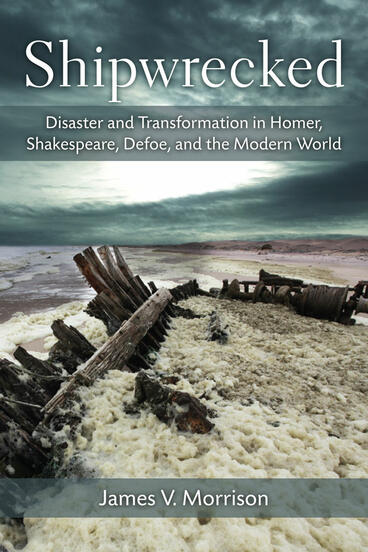Shipwrecked: Disaster and Transformation in Homer, Shakespeare, Defoe, and the Modern World presents the first comparative study of notable literary shipwrecks from the past four thousand years, focusing on Homer’s Odyssey, Shakespeare’s The Tempest, and Defoe’s Robinson Crusoe. James V. Morrison considers the historical context as well as the “triggers” (such as the 1609 Bermuda shipwreck) that inspired some of these works, and modern responses such as novels (Golding’s Lord of the Flies, Coetzee’s Foe, and Gordon’s First on Mars, a science fiction version of the Crusoe story), movies, television (Forbidden Planet, Cast Away, and Lost), and the poetry and plays of Caribbean poets Derek Walcott and Aimé Césaire.
The recurrent treatment of shipwrecks in the creative arts demonstrates an enduring fascination with this archetypal scene: a shipwreck survivor confronting the elements. It is remarkable, for example, that the characters in the 2004 television show Lost share so many features with those from Homer’s Odyssey and Shakespeare’s The Tempest.
For survivors who are stranded on an island for some period of time, shipwrecks often present the possibility of a change in political and social status—as well as romance and even paradise. In each of the major shipwreck narratives examined, the poet or novelist links the castaways’ arrival on a new shore with the possibility of a new sort of life. Readers will come to appreciate the shift in attitude toward the opportunities offered by shipwreck: older texts such as the Odyssey reveals a trajectory of returning to the previous order. In spite of enticing new temptations, Odysseus—and some of the survivors in The Tempest—revert to their previous lives, rejecting what many might consider paradise. Odysseus is reestablished as king; Prospero travels back to Milan. In such situations, we may more properly speak of potential transformations. In contrast, many recent shipwreck narratives instead embrace the possibility of a new sort of existence. That even now the shipwreck theme continues to be treated, in multiple media, testifies to its long-lasting appeal to a very wide audience.
Hardcover : 9780472119202, April 2014
Open Access : 9780472902101, March 2020
This open access version made available with the support of libraries participating in Knowledge Unlatched.










 Stumble It!
Stumble It!

No comments:
Post a Comment